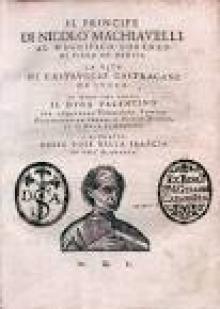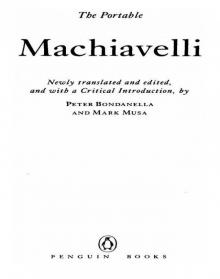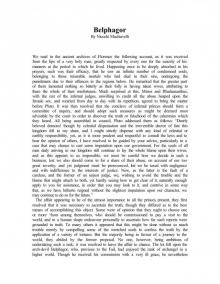- Home
- Niccolo Machiavelli
History of Florence and of the Affairs of Italy
History of Florence and of the Affairs of Italy Read online
Project Gutenberg Etext History of Florence and>, by Machiavelli
#4 in our series by Machiavelli
Copyright laws are changing all over the world, be sure to check
the copyright laws for your country before posting these files!!
Please take a look at the important information in this header.
We encourage you to keep this file on your own disk, keeping an
electronic path open for the next readers. Do not remove this.
**Welcome To The World of Free Plain Vanilla Electronic Texts**
**Etexts Readable By Both Humans and By Computers, Since 1971**
*These Etexts Prepared By Hundreds of Volunteers and Donations*
Information on contacting Project Gutenberg to get Etexts, and
further information is included below. We need your donations.
HISTORY OF FLORENCE
AND OF THE AFFAIRS OF ITALY
FROM THE EARLIEST TIMES TO THE
DEATH OF LORENZO THE MAGNIFICENT
by Niccolo Machiavelli
January, 2001 [Etext #2464]
Project Gutenberg Etext History of Florence and>, by Machiavelli
******This file should be named hflit10.txt or hflit10.zip******
Corrected EDITIONS of our etexts get a new NUMBER, hflit11.txt
VERSIONS based on separate sources get new LETTER, hflit10a.txt
Etext prepared by John Bickers, [email protected]
and Dagny, [email protected]
Project Gutenberg Etexts are usually created from multiple editions,
all of which are in the Public Domain in the United States, unless a
copyright notice is included. Therefore, we usually do NOT keep any
of these books in compliance with any particular paper edition.
We are now trying to release all our books one month in advance
of the official release dates, leaving time for better editing.
Please note: neither this list nor its contents are final till
midnight of the last day of the month of any such announcement.
The official release date of all Project Gutenberg Etexts is at
Midnight, Central Time, of the last day of the stated month. A
preliminary version may often be posted for suggestion, comment
and editing by those who wish to do so. To be sure you have an
up to date first edition [xxxxx10x.xxx] please check file sizes
in the first week of the next month. Since our ftp program has
a bug in it that scrambles the date [tried to fix and failed] a
look at the file size will have to do, but we will try to see a
new copy has at least one byte more or less.
Information about Project Gutenberg (one page)
We produce about two million dollars for each hour we work. The
time it takes us, a rather conservative estimate, is fifty hours
to get any etext selected, entered, proofread, edited, copyright
searched and analyzed, the copyright letters written, etc. This
projected audience is one hundred million readers. If our value
per text is nominally estimated at one dollar then we produce $2
million dollars per hour this year as we release thirty-six text
files per month, or 432 more Etexts in 1999 for a total of 2000+
If these reach just 10% of the computerized population, then the
total should reach over 200 billion Etexts given away this year.
The Goal of Project Gutenberg is to Give Away One Trillion Etext
Files by December 31, 2001. [10,000 x 100,000,000 = 1 Trillion]
This is ten thousand titles each to one hundred million readers,
which is only ~5% of the present number of computer users.
At our revised rates of production, we will reach only one-third
of that goal by the end of 2001, or about 3,333 Etexts unless we
manage to get some real funding; currently our funding is mostly
from Michael Hart's salary at Carnegie-Mellon University, and an
assortment of sporadic gifts; this salary is only good for a few
more years, so we are looking for something to replace it, as we
don't want Project Gutenberg to be so dependent on one person.
We need your donations more than ever!
All donations should be made to "Project Gutenberg/CMU": and are
tax deductible to the extent allowable by law. (CMU = Carnegie-
Mellon University).
For these and other matters, please mail to:
Project Gutenberg
P. O. Box 2782
Champaign, IL 61825
When all other email fails. . .try our Executive Director:
Michael S. Hart
[email protected] forwards to [email protected] and archive.org
if your mail bounces from archive.org, I will still see it, if
it bounces from prairienet.org, better resend later on. . . .
We would prefer to send you this information by email.
******
To access Project Gutenberg etexts, use any Web browser
to view http://promo.net/pg. This site lists Etexts by
author and by title, and includes information about how
to get involved with Project Gutenberg. You could also
download our past Newsletters, or subscribe here. This
is one of our major sites, please email [email protected],
for a more complete list of our various sites.
To go directly to the etext collections, use FTP or any
Web browser to visit a Project Gutenberg mirror (mirror
sites are available on 7 continents; mirrors are listed
at http://promo.net/pg).
Mac users, do NOT point and click, typing works better.
Example FTP session:
ftp sunsite.unc.edu
login: anonymous
password: your@login
cd pub/docs/books/gutenberg
cd etext90 through etext99
dir [to see files]
get or mget [to get files. . .set bin for zip files]
GET GUTINDEX.?? [to get a year's listing of books, e.g., GUTINDEX.99]
GET GUTINDEX.ALL [to get a listing of ALL books]
***
**Information prepared by the Project Gutenberg legal advisor**
(Three Pages)
***START**THE SMALL PRINT!**FOR PUBLIC DOMAIN ETEXTS**START***
Why is this "Small Print!" statement here? You know: lawyers.
They tell us you might sue us if there is something wrong with
your copy of this etext, even if you got it for free from
someone other than us, and even if what's wrong is not our
fault. So, among other things, this "Small Print!" statement
disclaims most of our liability to you. It also tells you how
you can distribute copies of this etext if you want to.
*BEFORE!* YOU USE OR READ THIS ETEXT
By using or reading any part of this PROJECT GUTENBERG-tm
etext, you indicate that you understand, agree to and accept
this "Small Print!" statement. If you do not, you can receive
a refund of the money (if any) you paid for this etext by
sending a request within 30 days of receiving it to the person
you got it from. If you received this etext on a physical
medium (such as a disk), you must return it with your r
equest.
ABOUT PROJECT GUTENBERG-TM ETEXTS
This PROJECT GUTENBERG-tm etext, like most PROJECT GUTENBERG-
tm etexts, is a "public domain" work distributed by Professor
Michael S. Hart through the Project Gutenberg Association at
Carnegie-Mellon University (the "Project"). Among other
things, this means that no one owns a United States copyright
on or for this work, so the Project (and you!) can copy and
distribute it in the United States without permission and
without paying copyright royalties. Special rules, set forth
below, apply if you wish to copy and distribute this etext
under the Project's "PROJECT GUTENBERG" trademark.
To create these etexts, the Project expends considerable
efforts to identify, transcribe and proofread public domain
works. Despite these efforts, the Project's etexts and any
medium they may be on may contain "Defects". Among other
things, Defects may take the form of incomplete, inaccurate or
corrupt data, transcription errors, a copyright or other
intellectual property infringement, a defective or damaged
disk or other etext medium, a computer virus, or computer
codes that damage or cannot be read by your equipment.
LIMITED WARRANTY; DISCLAIMER OF DAMAGES
But for the "Right of Replacement or Refund" described below,
[1] the Project (and any other party you may receive this
etext from as a PROJECT GUTENBERG-tm etext) disclaims all
liability to you for damages, costs and expenses, including
legal fees, and [2] YOU HAVE NO REMEDIES FOR NEGLIGENCE OR
UNDER STRICT LIABILITY, OR FOR BREACH OF WARRANTY OR CONTRACT,
INCLUDING BUT NOT LIMITED TO INDIRECT, CONSEQUENTIAL, PUNITIVE
OR INCIDENTAL DAMAGES, EVEN IF YOU GIVE NOTICE OF THE
POSSIBILITY OF SUCH DAMAGES.
If you discover a Defect in this etext within 90 days of
receiving it, you can receive a refund of the money (if any)
you paid for it by sending an explanatory note within that
time to the person you received it from. If you received it
on a physical medium, you must return it with your note, and
such person may choose to alternatively give you a replacement
copy. If you received it electronically, such person may
choose to alternatively give you a second opportunity to
receive it electronically.
THIS ETEXT IS OTHERWISE PROVIDED TO YOU "AS-IS". NO OTHER
WARRANTIES OF ANY KIND, EXPRESS OR IMPLIED, ARE MADE TO YOU AS
TO THE ETEXT OR ANY MEDIUM IT MAY BE ON, INCLUDING BUT NOT
LIMITED TO WARRANTIES OF MERCHANTABILITY OR FITNESS FOR A
PARTICULAR PURPOSE.
Some states do not allow disclaimers of implied warranties or
the exclusion or limitation of consequential damages, so the
above disclaimers and exclusions may not apply to you, and you
may have other legal rights.
INDEMNITY
You will indemnify and hold the Project, its directors,
officers, members and agents harmless from all liability, cost
and expense, including legal fees, that arise directly or
indirectly from any of the following that you do or cause:
[1] distribution of this etext, [2] alteration, modification,
or addition to the etext, or [3] any Defect.
DISTRIBUTION UNDER "PROJECT GUTENBERG-tm"
You may distribute copies of this etext electronically, or by
disk, book or any other medium if you either delete this
"Small Print!" and all other references to Project Gutenberg,
or:
[1] Only give exact copies of it. Among other things, this
requires that you do not remove, alter or modify the
etext or this "small print!" statement. You may however,
if you wish, distribute this etext in machine readable
binary, compressed, mark-up, or proprietary form,
including any form resulting from conversion by word pro-
cessing or hypertext software, but only so long as
*EITHER*:
[*] The etext, when displayed, is clearly readable, and
does *not* contain characters other than those
intended by the author of the work, although tilde
(~), asterisk (*) and underline (_) characters may
be used to convey punctuation intended by the
author, and additional characters may be used to
indicate hypertext links; OR
[*] The etext may be readily converted by the reader at
no expense into plain ASCII, EBCDIC or equivalent
form by the program that displays the etext (as is
the case, for instance, with most word processors);
OR
[*] You provide, or agree to also provide on request at
no additional cost, fee or expense, a copy of the
etext in its original plain ASCII form (or in EBCDIC
or other equivalent proprietary form).
[2] Honor the etext refund and replacement provisions of this
"Small Print!" statement.
[3] Pay a trademark license fee to the Project of 20% of the
net profits you derive calculated using the method you
already use to calculate your applicable taxes. If you
don't derive profits, no royalty is due. Royalties are
payable to "Project Gutenberg Association/Carnegie-Mellon
University" within the 60 days following each
date you prepare (or were legally required to prepare)
your annual (or equivalent periodic) tax return.
WHAT IF YOU *WANT* TO SEND MONEY EVEN IF YOU DON'T HAVE TO?
The Project gratefully accepts contributions in money, time,
scanning machines, OCR software, public domain etexts, royalty
free copyright licenses, and every other sort of contribution
you can think of. Money should be paid to "Project Gutenberg
Association / Carnegie-Mellon University".
We are planning on making some changes in our donation structure
in 2000, so you might want to email me, [email protected] beforehand.
*END THE SMALL PRINT! FOR PUBLIC DOMAIN ETEXTS*Ver.04.29.93*END*
Etext prepared by John Bickers, [email protected]
and Dagny, [email protected]
HISTORY OF FLORENCE
AND OF THE AFFAIRS OF ITALY
FROM THE EARLIEST TIMES TO THE
DEATH OF LORENZO THE MAGNIFICENT
by NICCOLO MACHIAVELLI
With an Introduction by
HUGO ALBERT RENNERT, Ph.D.
Professor of Romanic Languages and Literature,
University of Pennsylvania.
PREPARER'S NOTE
This text was typed up from a Universal Classics Library edition,
published in 1901 by W. Walter Dunne, New York and London. The
translator was not named. The book contains a "photogravure" of
Niccolo Machiavelli from an engraving.
INTRODUCTION
Niccolo Machiavelli, the first great Italian historian, and one of the
most eminent political writers of any age or country, was born at
Florence, May 3, 1469. He was of an old though not wealthy Tuscan
family, his father, who was a jurist, dying when Niccolo was sixteen
years old. We know nothing of Machiavelli'
s youth and little about his
studies. He does not seem to have received the usual humanistic
education of his time, as he knew no Greek.[*] The first notice of
Machiavelli is in 1498 when we find him holding the office of
Secretary in the second Chancery of the Signoria, which office he
retained till the downfall of the Florentine Republic in 1512. His
unusual ability was soon recognized, and in 1500 he was sent on a
mission to Louis XII. of France, and afterward on an embassy to C�sar
Borgia, the lord of Romagna, at Urbino. Machiavelli's report and
description of this and subsequent embassies to this prince, shows his
undisguised admiration for the courage and cunning of C�sar, who was a
master in the application of the principles afterwards exposed in such
a skillful and uncompromising manner by Machiavelli in his /Prince/.
The limits of this introduction will not permit us to follow with any
detail the many important duties with which he was charged by his
native state, all of which he fulfilled with the utmost fidelity and
with consummate skill. When, after the battle of Ravenna in 1512 the
holy league determined upon the downfall of Pier Soderini,
Gonfaloniere of the Florentine Republic, and the restoration of the
Medici, the efforts of Machiavelli, who was an ardent republican, were
in vain; the troops he had helped to organize fled before the
Spaniards and the Medici were returned to power. Machiavelli attempted
to conciliate his new masters, but he was deprived of his office, and
being accused in the following year of participation in the conspiracy
of Boccoli and Capponi, he was imprisoned and tortured, though
afterward set at liberty by Pope Leo X. He now retired to a small
estate near San Casciano, seven miles from Florence. Here he devoted
himself to political and historical studies, and though apparently
retired from public life, his letters show the deep and passionate
interest he took in the political vicissitudes through which Italy was
then passing, and in all of which the singleness of purpose with which
he continued to advance his native Florence, is clearly manifested. It
was during his retirement upon his little estate at San Casciano that
Machiavelli wrote /The Prince/, the most famous of all his writings,
and here also he had begun a much more extensive work, his /Discourses
on the Decades of Livy/, which continued to occupy him for several
years. These /Discourses/, which do not form a continuous commentary
on Livy, give Machiavelli an opportunity to express his own views on
the government of the state, a task for which his long and varied
political experience, and an assiduous study of the ancients rendered
him eminently qualified. The /Discourses/ and /The Prince/, written at
the same time, supplement each other and are really one work. Indeed,
the treatise, /The Art of War/, though not written till 1520 should be
mentioned here because of its intimate connection with these two
treatises, it being, in fact, a further development of some of the
thoughts expressed in the /Discorsi/. /The Prince/, a short work,
divided into twenty-six books, is the best known of all Machiavelli's
writings. Herein he expresses in his own masterly way his views on the
founding of a new state, taking for his type and model C�sar Borgia,
although the latter had failed in his schemes for the consolidation of
his power in the Romagna. The principles here laid down were the
natural outgrowth of the confused political conditions of his time.
And as in the /Principe/, as its name indicates, Machiavelli is
concerned chiefly with the government of a Prince, so the /Discorsi/
treat principally of the Republic, and here Machiavelli's model
republic was the Roman commonwealth, the most successful and most
enduring example of popular government. Free Rome is the embodiment of

 The Prince
The Prince Valentino
Valentino The Portable Machiavelli
The Portable Machiavelli History of Florence and of the Affairs of Italy
History of Florence and of the Affairs of Italy Belphagor
Belphagor